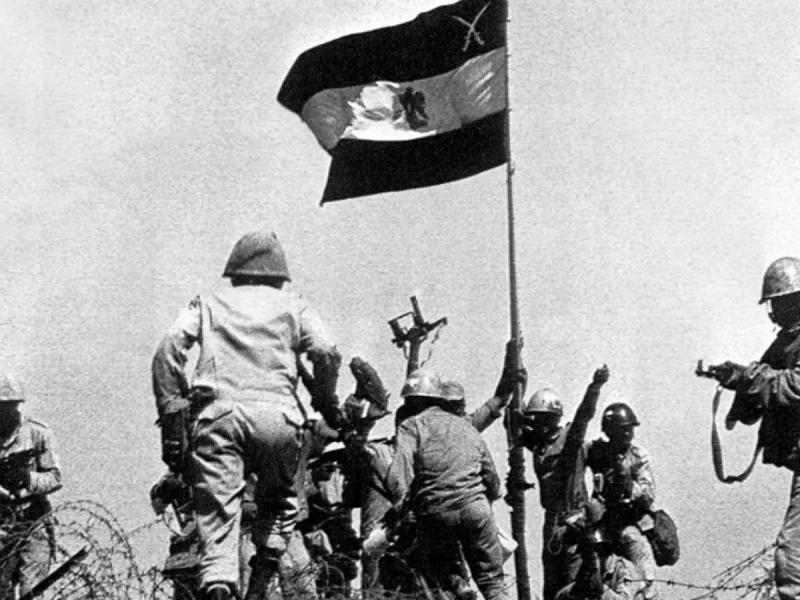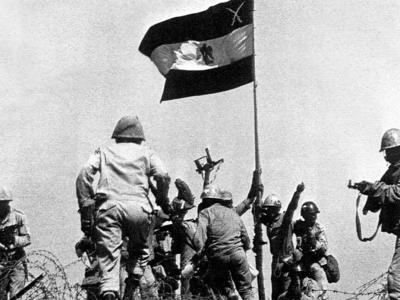On the 42nd anniversary of the liberation of Sinai, how did the state manage to reclaim its land through the power of arms and peace?
The 42nd anniversary of the liberation of Sinai and the restoration of the entire national territory signifies one of the most honorable battles to restore the dignity and pride of the nation. This victory is a testament to steadfastness, strength of will, strategic planning, and execution. Egypt chose a path of reclaiming land through military force while establishing its laws through peace. After the liberation battle, the Egyptian state initiated a reconstruction campaign that touched every inch of the land in Sinai under the leadership of President Abdel Fattah el-Sisi. Development efforts have encompassed all aspects of life in Sinai, and we remember the heroism of the armed forces and police who sacrificed their lives to liberate the land once again from the clutches of terrorism. A tribute to their pure souls and the noble blood that nourished the land of Sinai.
### Sinai: A Target for Invaders Throughout History
Strategic thinker and former head of moral affairs at the Egyptian army, Lieutenant General Samir Farag states that Egypt is the only country that reclaimed its land following the setbacks of 1967, when Israel occupied Sinai, the West Bank, and the Golan Heights in Syria. He points out that the battle to reclaim land and liberate Sinai unfolded in three phases.
The first battle was represented in the War of October 6, during which Israel suffered a crushing defeat and incurred massive losses, leading to disbelief among its leaders, including Moshe Dayan. Strategic deception played a significant role in the victory of October 6.
According to General Farag, the second battle was a political one that could not have happened without the glorious October War, as it paved the way for the Camp David Accords between Egypt and Israel in September 1978, following the historic initiative of late President Anwar Sadat in November 1977, including his visit to Jerusalem, which lasted a week leading to an agreement.
The strategic thinker emphasized that Israel hesitated during the implementation phase, especially concerning Taba's return, leading Egypt to resort to international arbitration as per the Camp David Accords. He noted that the third battle was a judicial one, where Israel cited a marking issue along the border, while Egypt presented documents regarding the boundaries of Palestine during the British mandate and others clarifying the borders of Egypt under the Ottoman Empire. Consequently, the international arbitration panel ruled unanimously in a session held in the Geneva Parliament that Taba is Egyptian territory, and on March 19, 1989, the late President Hosni Mubarak raised the Egyptian flag over Taba.
He asserted that Sinai, as Egypt's eastern gateway, has historically been a target for invaders. It has also faced the most severe and dangerous wave of terrorism throughout Egypt's history, and finally, the battle against the forced displacement of Palestinians, which the political leadership strongly resists. He stressed that the anniversary of Sinai's liberation teaches that no right is lost if there are claims, and that Egypt will not forfeit its land under any circumstances.
### Strength of Will: The Key to Liberating Sinai
Lieutenant General Nasr Salem, consultant at Nasser Military Academy, confirms that the strength of will is the fundamental pillar in Egypt's battle for the liberation of Sinai. He noted that June 9 and 10, 1976, marked a turning point in Egypt's history due to the horrific defeat that was unimaginable, leading to military and political instability in a country without identity.
He added that despite the defeat of all state capabilities, one force remained unbroken—the will of the Egyptian people who refused defeat and maintained their resolve, which proved to be the key in that battle, affirming what the late President Gamal Abdel Nasser said, that what is taken by force can only be restored by force.
He also pointed out that following that phase, Egypt confronted defeat with an unmatched determination. The singular goal was land reclamation, with the Egyptian street playing a significant role. Victory or martyrdom were the only paths for Egypt's heroes in reclaiming Sinai during the October 6 war, which witnessed our great army shatter the myth of the Bar Lev Line, the strongest Israeli defense line, which the Egyptian army breached in less than six hours. This resulted in a blow that Israel could never have imagined in history, leading to political discussions in November 1973 to restore the land. He stated, "Without war, we would not have regained our land from Israel... Diplomacy was Egypt's second pathway to assert its voice and regain its entire territory."
### A Crown on the Conclusion of the Battle of War and Peace
In turn, Counselor Hussein Abu Al-Atta, Chairman of the "Egyptians" Party and member of the Executive Bureau of the Egyptian Political Parties Alliance, congratulated President Abdel Fattah el-Sisi, Supreme Commander of the Armed Forces, and General Mohamed Zaki, Chief of Staff, along with the brave soldiers, officers, and commanders of the armed forces, and the great Egyptian people, on the 42nd anniversary of the Sinai Liberation Day.
Abu Al-Atta stated in a special statement to "Youm7" that the liberation of Sinai crowned the conclusion of the battle of war and peace, marked by the Egyptian army's success in achieving victory and restoring dignity and honor by raising the Egyptian flag over the land of Sinai; that pure land and the crossing of prophets, a sacred spot that has always represented strategic depth for Egypt, holds a steadfast place in the hearts of all Egyptians.
He emphasized that the day of Sinai's liberation remains a special memory in the consciousness of every Egyptian. The epic of land restoration has transcended being merely a military and diplomatic victory to become a lasting model of overcoming despair and hopelessness to reclaim dignity both militarily and politically.
The President of the "Egyptians" Party pointed out that Egypt successfully transitioned from war to peace in liberating the land of Sinai after its occupation by the Zionist enemy on June 5, 1967, starting from the War of Attrition in 1969 and culminating in the Victory War on October 6, 1973. Egypt entered a new phase of political and diplomatic struggle to reclaim the remaining territories, coming after the success of Egyptian diplomacy in negotiating with global politicians to regain a precious part of the homeland.
This anniversary coincides with the political leadership's efforts to reconstruct and develop the land of Sinai, where the day of liberation was one of the pivotal days in modern Egyptian history, crowning the battle of war and peace starting from the October War of 1973, during which the Egyptian army achieved victory, paving the way for peace negotiations until the complete recovery of Sinai.
He pointed out that Taba was reclaimed in 1988, where Egyptian diplomacy achieved significant success and the Egyptian flag was also raised there. The state began its political and diplomatic work starting from negotiations and discussions, leading to the signing of the Camp David Accords, followed by the Egyptian-Israeli peace treaty in 1979. Over three years, the Egyptian state achieved its goal and regained Sinai after the Israeli withdrawal on April 25, 1982.
He affirmed that the memory of the Sinai liberation stands as one of the greatest military and diplomatic achievements in Egyptian history, epitomizing value and lasting greatness. It has entrenched the sacred mission of our armed forces in defending the homeland and safeguarding the dignity and capabilities of its people, asserting that the sons of Egypt will not forfeit an inch of their land regardless of the cost.
He emphasized that Egypt sacrificed to reclaim Sinai, this sacred area, with the purest souls of its men, fighting the greatest battles in modern world history, establishing to the world through historical events that Egypt, its land, and the dignity of its people remain a red line that will not be violated. He indicated that the memory of Sinai's liberation will remain engraved in the hearts and consciousness of every Egyptian. The armed forces remain a school in defeating despair and overcoming the impossible, a source of our pride, and the foundation of our renaissance and security.
He concluded by stating that as we celebrate the anniversary of the strongest battles and military and diplomatic victories, Egypt is engaged in a battle of construction, renaissance, development, and peace, proving to the world that Egypt's peace and its efforts to enhance global peace is its first choice and a steadfast constitution for resolving any crises, no matter the challenges faced. He remarked: "The heroes of the armed forces, the champions of dignity and honor, have penned the brightest pages in the history of Egyptian nationalism with their pure blood, placing loyalty and belonging to the homeland at the forefront, valuing it more than life itself. They deserve to be commemorated, and we ask God to grant them places among the righteous," extending his regards and appreciation to the spirits of our armed forces' soldiers who left before us a great model to emulate in how to give and sacrifice for the homeland to live in dignity and honor with its people held high.
He concluded: "Egypt's celebration of the 42nd anniversary of the Sinai Liberation coincides with the declaration of the eradication of terrorism and the return of security to the beloved land of peace, Sinai, and we renew our pledge to stand behind the political leadership in one united front on the path of comprehensive construction and renaissance. May God protect Egypt and its people."




